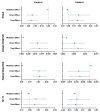Dietary Habits and Psychological States during COVID-19 Home Isolation in Italian College Students: The Role of Physical Exercise
- PMID: 33260711
- PMCID: PMC7759990
- DOI: 10.3390/nu12123660
Dietary Habits and Psychological States during COVID-19 Home Isolation in Italian College Students: The Role of Physical Exercise
Abstract
Social isolation has adverse effects on mental health, physical exercise, and dietary habits. This longitudinal observational study aimed to investigate the effects of mood states and exercise on nutritional choices, on 176 college students (92 males, 84 females; 23 ± 4 years old) during the COVID-19 lockdown. During 21 days, nutrition and exercise were daily monitored, and the mood states assessed. A factor analysis was used to reduce the number of nutritional variables collected. The relationships between exercise, mood and nutrition were investigated using a multivariate general linear model and a mediation model. Seven factors were found, reflecting different nutritional choices. Exercise was positively associated with fruit, vegetables and fish consumption (p = 0.004). Depression and quality of life were, directly and inversely, associated with cereals, legumes (p = 0.005; p = 0.004) and low-fat meat intake (p = 0.040; p = 0.004). Exercise mediated the effect of mood states on fruit, vegetables and fish consumption, respectively, accounting for 4.2% and 1.8% of the total variance. Poorer mood states possibly led to unhealthy dietary habits, which can themselves be linked to negative mood levels. Exercise led to healthier nutritional choices, and mediating the effects of mood states, it might represent a key measure in uncommon situations, such as home-confinement.
Keywords: diet; exercise; lifestyle; mood; quarantine; young adults.
Conflict of interest statement
The authors declare no conflict of interest.
Figures






References
-
- Ammar A., Trabelsi K., Brach M., Chtourou H., Boukhris O., Masmoudi L., Bouaziz B., Bentlage E., How D., Ahmed M., et al. Effects of home confinement on mental health and lifestyle behaviours during the COVID-19 outbreak: Insight from the ECLB-COVID19 multicenter study. Biol. Sport. 2020 doi: 10.5114/biolsport.2020.96857. - DOI - PMC - PubMed
-
- Di Fronso S., Costa S., Montesano C., Di Gruttola F., Ciofi E.G., Morgilli L., Robazza C., Bertollo M. The effects of COVID-19 pandemic on perceived stress and psychobiosocial states in Italian athletes. Int. J. Sport Exerc. Psychol. 2020 doi: 10.1080/1612197X.2020.1802612. - DOI
-
- Chirico A., Lucidi F., Galli F., Giancamilli F., Vitale J., Borghi S., La Torre A., Codella R. COVID-19 Outbreak and Physical Activity in the Italian Population: A Cross-Sectional Analysis of the Underlying Psychosocial Mechanisms. Front. Psychol. 2020;11:2100. doi: 10.3389/fpsyg.2020.02100. - DOI - PMC - PubMed
Publication types
MeSH terms
LinkOut - more resources
Full Text Sources
Medical

